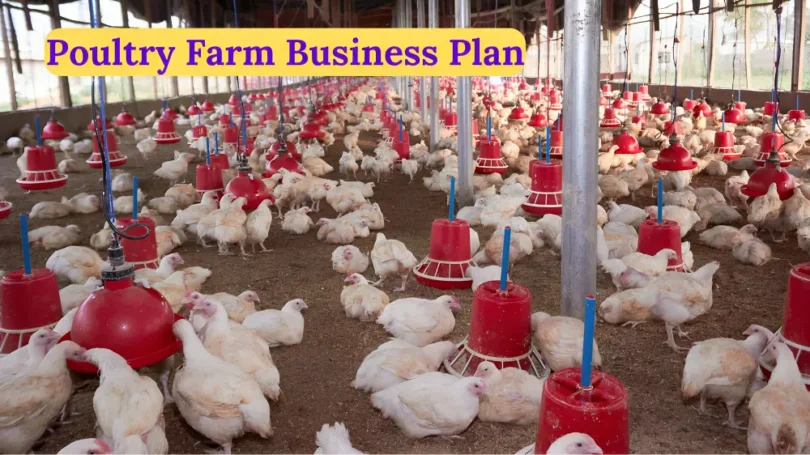There are plenty of profitable opportunities in the agricultural sector, with poultry farming being one of the most lucrative. Raising hens for eggs or meat production has long been a respected and thriving industry. But entering the Poultry Farm Business Plan requires careful preparation, commitment, and a well-thought-out business plan. We’ll dive into the key elements of creating a profitable Poultry Farm Business Plan in this article.
What is a Poultry Farm Business Plan?
Domesticated birds like chickens, ducks, turkeys, and geese are raised in poultry farms to produce meat or eggs. Commercial poultry farming yields meat, eggs, duck, turkey, and chicken. Layer farms and broiler farms are the two different categories of poultry farm enterprises. Whereas broiler farms concentrate on raising chickens for meat production, layer farms concentrate on raising chickens for eggs.
How to Start Poultry Farm Business Plan in India?
Poultry Farm Business Plan and Research
- Establish the necessary equipment list.
- Specify your spending and objectives.
- Get the necessary licenses and permissions.
- Decide which species of bird you wish to breed.
- Examine the demand in the area where you intend to open it.
- Choose the kind of poultry farm you want to start: breeding broilers, producing eggs, or doing both.
Selecting Poultry Farm Business Plan Type
- Semi-range poultry farm: A farm with an area of about 8000 square feet is needed for it.
- Free-range poultry farm: This kind of farm is usually between 12,000 and 36,000 square feet in size and permits birds to roam freely.
- Battery cage poultry farm: This kind of farm is usually 6000 square feet in size and does not permit birds to fly freely.
- Completely wild poultry farm: With a total area of 44,000 square feet, it is the biggest chicken farm. With so many trees in the area, it resembles a natural habitat.
Determine the Type of Breeds
- Layer chickens: These varieties of hens can lay eggs until they are 72–78 weeks old, starting when they are 18–19 weeks old. With about 2.25 kg of feed consumed annually, they can lay more than 250 eggs.
- Broiler chickens: Their quick development—they reach full maturity in just eight weeks—is what sets them apart. These chickens are famous for producing a lot of meat.
- Rooster chickens: They are also called cocks and symbolize the male individuals of the gallinaceous bird species. Because of their territorial instincts, roosters guard the eggs laid by hens. Roosters are easily transportable because they can adapt to any kind of environment.
Arranging Funds
- Make arrangements to obtain money from a bank, NBFC, or other lending institution. Applying for a business loan is contingent upon the interest rate that various financial institutions charge.
- Now that you have the money, keep a careful eye on your finances and record all of your outlays and income. Establish competitive prices for your products by calculating the cost of production per unit. Analyze your company’s profitability regularly and make adjustments.
Care and Management of Poultry Farm Business Plan
- Feeding and Nutrition: Create a well-rounded feeding schedule that satisfies your poultry’s dietary needs. To guarantee ideal growth and productivity, seek advice from nutritionists and veterinarians.
- Health and Disease Management: Put biosecurity measures in place to stop diseases from entering and spreading. Vaccinate your poultry stock regularly.
- Waste Management: Put in place waste disposal methods that respect regional laws. Keeping your poultry in a clean and healthy environment is also facilitated by proper waste management.
Marketing and Distribution of Poultry Farm Business Plan
- Disease Outbreaks: Disease outbreaks on poultry farms have the potential to cause large losses. This risk can be reduced by putting biosecurity measures in place and collaborating closely with veterinarians.
- Market Fluctuations: Prices of poultry products can be affected by demand patterns and changes in the market. You can help stabilize your income by investigating value-added products and implementing a diversified marketing strategy.
- Regulatory Compliance: Several laws and guidelines about environmental standards, food safety, and animal welfare apply to poultry farming. To stay out of trouble and avoid penalties, you should abide by all legal requirements.
- Initial Investment: Infrastructure, machinery, and livestock must all be purchased with a large initial investment when starting a poultry farm. Obtain sufficient funds via grants, loans, or personal savings.
- Labour Management: Effective workforce management is essential for seamless operations. Proper supervision and adequate training can improve animal care and productivity.
Top Pesticide Companies in India








Leave a Comment